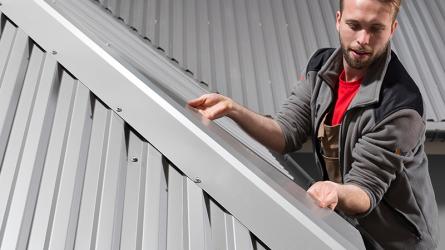A visit to a plant in Kashubia - a reportage
- Details
Quality and safety: products made in Poland.
A visit to a plant in Kashubia - a reportage
Quality and safety: products made in Poland.
"Bolszewo? That's where Balex Metal is. Go past Wejherowo, on the road to Szczecin," explains a local resident, gesticulating. “They produce tiles, but not only that. I remember their advert, 'Sheets for roofs' - maybe you've heard of it?"
That was at the start of the company. Now, Bolszewo is widely known from the walls and roofs made of sandwich panels for hundreds of industrial and commercial premises. And it can be proudly stated that everything is "Made in Poland".
It's only a quarter to six in the morning. Before I enter the building, I try to go around it. I give up very quickly. The photos taken from the airplane distort the perspective. The plant area isn't big; it's enormous! A walk around it would take at least an hour.
When I notice a group of women in checked shirts, I realise that stereotypes are just a trap. In the facility it is the work style which dictates parities. Precision and multitasking are what characterise the fair sex, and, with the automatisation of the majority of production, working with steel sheets is effortless, but equally responsible.
On the other hand, there are plenty of men, too. I know it from the pictures on the calendar hanging in the place where the forklift trucks are serviced. The cover girl is an everyday witness to an extraordinary show: the dance of the manoeuvring forklifts.
It's already after six, and the route between the production hall and the freight yard is getting busier, as if we were in a big agglomeration during rush hour. Indeed, the plant in Bolszewo in a way is a bustling city. The yard is being crossed by forklift trucks, bikes, lorries, and pedestrians, as if it were a busy crossroads.
"During the season, I open the gate for semi-trailers up to several dozen times a day," says Piotr, who is responsible for controlling the traffic on the yard. "They take other roads to leave, so it's about 80 vehicles every 24 hours. I recommend visiting the production line, then you'll see yourself how much we produce here."
In huge halls numbered 2, 3, and 4 we can observe the production of sandwich panels with different types of cores, from EPS to mineral wool, ending at the most-modern form, which provides an excellent thermal insulation - polyurethane - also known as PIR.
I enter the first building, just to find myself in... a maze. It's because of the EPS columns, which go up to the ceiling. Although it looks like a science-fiction-movie set, it's just a pile of materials waiting to be enclosed in sandwiches made of steel sheets.
My attention is captured by a few pieces put to one side. As the shift foreman later explained to me, this is the storage place for materials which didn't pass quality control and have to be utilised. Only after a while do I notice that the rejected EPS is the subject of a creative output.
The last hall is the production place for PIR panels, which are favoured products of clients from Scandinavia, Benelux and Russia. They are light, but durable, and provide excellent thermal insulation. That's why companies specialising in constructing large premises, such as warehouses, logistics centres, and production plants, consider them the best product.
When I look inside, I see only three employees, so I wonder how it is possible that they've forgotten to turn off the production line while everyone is on breakfast break. "It's not like that. The break is in an hour," laughs Radek, the shift foreman. "The process is so automated that we only need to supervise it. However, it's not as simple as it might seem. A tiny mistake, and we stop production. A Swede, Pole or Russian, must receive good material" he explains. "It's about loyalty to our clients, as some of them have been with us since the beginning of our production process, and we can't let them down; it’s also about safety”.
“These are construction materials which must be effective in very-demanding use conditions," adds Krzysiek, who is responsible for the exporting of the panels to Scandinavian markets.
The production facility in Bolszewo is frequently visited by guests from abroad. "That's the feature of this industry," explains Magda, the export-department manager. "When it comes to new clients, we gain credibility by being totally transparent. We have nothing to hide, and, what's more, we can boast about our modern production lines and... the building." (she laughs).
Its shape is quite extraordinary - for some people it looks like a giant speed camera, while others think it's a periscope sticking out of the ground.
It's nearly 2 pm. The yard is getting busy again, this time both ways. One shift passes the other. The employees greet each other, give each other high fives. "Here, in Kashubia, people are very close-knit. That's what we are," says Adam, who is responsible for marketing in Balex, at the end of my adventure in Bolszewo.









Your reply